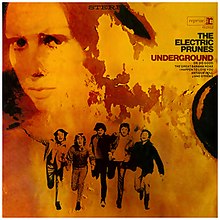
Psychedelic rock is a rock music genre that is inspired, influenced, or representative of psychedelic culture, which is centered on perception-altering hallucinogenic drugs. The music incorporated new electronic sound effects and recording techniques, extended instrumental solos, and improvisation. Many psychedelic groups differ in style, and the label is often applied spuriously.
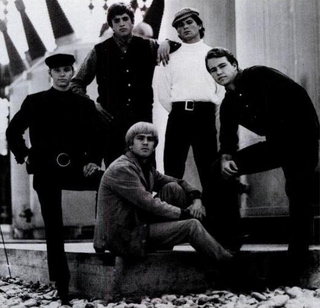
The Electric Prunes are an American psychedelic rock band, formed in Los Angeles, California, in 1965. Much of the band's music was, as music historian Richie Unterberger described it, possessed of "an eerie and sometimes anguished ambiance." Their most successful material was by songwriters Annette Tucker and Nancie Mantz, though the group also penned their own songs. Incorporating psychedelia and elements of embryonic electronic rock, the band's sound was marked by innovative recording techniques with fuzz-toned guitars and oscillating sound effects. In addition, guitarist Ken Williams' and singer James Lowe's concept of "free-form garage music" provided the band with a richer sonic palette and exploratory lyrical structure than many of their contemporaries.
Proto-punk is rock music from the 1960s to mid-1970s that foreshadowed the punk rock movement. A retrospective label, the musicians involved were generally not originally associated with each other and came from a variety of backgrounds and styles; together, they anticipated many of punk's musical and thematic attributes. The tendency towards aggressive, simplistic rock songs is a trend critics such as Lester Bangs have traced to as far back as Ritchie Valens' 1958 version of the Mexican folk song "La Bamba", which set in motion a wave of influential garage rock bands including the Kingsmen, the Kinks, the 13th Floor Elevators and the Sonics. By the late 1960s, Detroit bands the Stooges and MC5 had used the influence of these groups to form a distinct prototypical punk sound. In the following years, this sound spread both domestically and internationally, leading to the formation of the New York Dolls, Electric Eels (Cleveland), Dr. Feelgood (England) and the Saints (Australia).
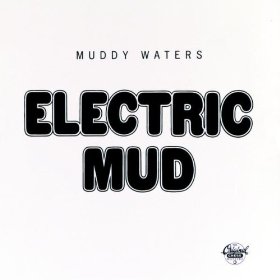
Electric Mud is the fifth studio album by Muddy Waters, with members of Rotary Connection playing as his backing band. Released in 1968, it presents Muddy Waters as a psychedelic musician. Producer Marshall Chess suggested that Muddy Waters record it in an attempt to appeal to a rock audience.
Psychedelic folk is a loosely defined form of psychedelia that originated in the 1960s. It retains the largely acoustic instrumentation of folk, but adds musical elements common to psychedelic music.

Mass in F Minor is the third studio album by American rock band The Electric Prunes, released in 1968. It consists of a musical setting of the mass sung in Latin and Greek and arranged in the psychedelic style of the band, and was written and arranged by David Axelrod.

California is the seventh album by The Electric Prunes, released in 2004 and featuring founding members James Lowe, Ken Williams, and Mark Tulin.

Just Good Old Rock and Roll is the fifth studio album by The Electric Prunes, released in 1969. It was recorded with a lineup put together by Wilson-Fisher management for David Hassinger, who owned the name, during a period in which the original group was disbanded. This album took the Prunes' music decidedly away from the previous experimentation and underground psychedelia into more driving rock music. While there are elements of mild psychedelia present, the group's new direction pointed towards the boogie-rock that would be further developed in the 1970s by bands such as The James Gang, Cactus and Foghat.
Walter David Hassinger was an American Grammy award-winning recording engineer and record producer.

Annette May Tucker is an American songwriter, who found success in the 1960s as co-writer of songs for The Electric Prunes, The Brogues, The Knickerbockers, Nancy and Frank Sinatra and others.
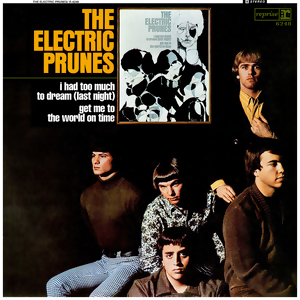
The Electric Prunes, sometimes referred to as I Had Too Much to Dream (Last Night), is the 1967 debut album by the American garage rock band, the Electric Prunes, released on Reprise Records. The first track, "I Had Too Much to Dream (Last Night)", was a hit and became the band's signature tune. The album also contains another notable psychedelic rock composition, "Get Me to the World on Time". The album was listed in the book 1001 Albums You Must Hear Before You Die.
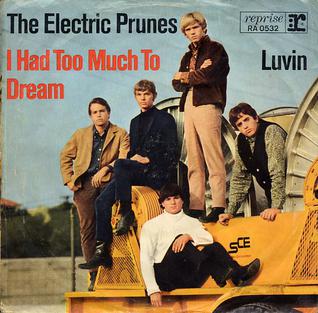
"I Had Too Much to Dream (Last Night)" is a song written with music by Annette Tucker and lyrics by Nancie Mantz, which was recorded in late 1966 by the garage rock band The Electric Prunes. Released as the band's second single, it reached number 49 in the UK and peaked at number 11 on the Billboard Hot 100 the week ending February 11, 1967.

Mark Shalom Tulin was an American bass guitarist who played with the psychedelic rock band The Electric Prunes.

Triangle is the fourth studio album by American rock band the Beau Brummels. Produced by Lenny Waronker and released in July 1967, it was the band's first album to include songs that vocalist Sal Valentino and guitarist Ron Elliott composed together. The band incorporated fantasy elements and surreal characters into the album's song titles and lyrics, and worked with a variety of session musicians to create Triangle's psychedelic musical style. The Beau Brummels were reduced to a trio—Valentino, Elliott, and Ron Meagher—at the time Triangle was recorded, as former group members Don Irving (guitars) and John Petersen (drums) left the band following the release of the group's previous album, Beau Brummels '66.
The Love Exchange was an American psychedelic rock band, best known for their single "Swallow the Sun", released in 1967. Sixteen-year-old Bonnie Blunt was the band's lead singer. They were signed by Uptown Records, a subsidiary of MCA Records.

Artifact is an album by The Electric Prunes, self-released in 2001. It was their first studio album since 1969.

"Get Me to the World on Time" is a song written by Annette Tucker and Jill Jones for the American garage rock band, The Electric Prunes. The song was released in May 1967 following the success of the band's previous single, "I Had Too Much to Dream ". Although the follow-up did not have the same success, "Get Me to the World on Time" still charted at number 27 on the Billboard Hot 100. The single also fared slightly better in the UK, where it reached number 42.
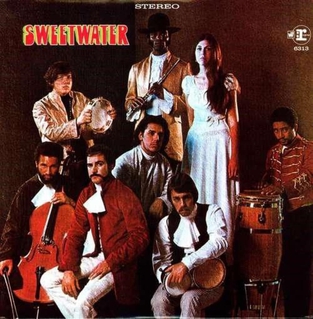
Sweetwater is the debut studio album by the Los Angeles band, Sweetwater. The album is musically enriched by several influences from different genres that the band sought to experiment with. Much of the band's resemblance came from Jefferson Airplane, the group that successfully integrated jazz fusion into their compositions. Upon the album's release, it was largely unnoticed, but still became the band's only work to chart in the Billboard 200. Their most acclaimed track is the opening cover version of "Motherless Child".

Thaddeus James Lowe is an American musician and record producer, best known as the lead singer of 1960s psychedelic rock band The Electric Prunes and as an audio engineer and producer with Todd Rundgren and the band Sparks.
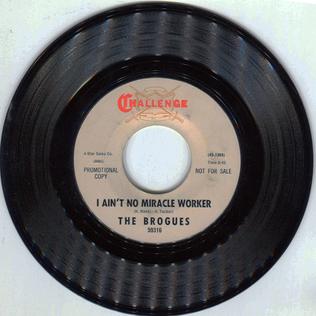
"I Ain't No Miracle Worker" is a song by the American garage rock band, the Brogues, written by Annette Tucker and Nancie Mantz, and released as the group's second and final single on Challenge Records, in November 1965. The composition is now considered a classic of the musical genre of garage rock, and has reappeared on several compilation albums and has been covered by other musical artists. The Brogues' original rendition was musically influenced by their contemporaries on the R&B circuit and the British Invasion.
